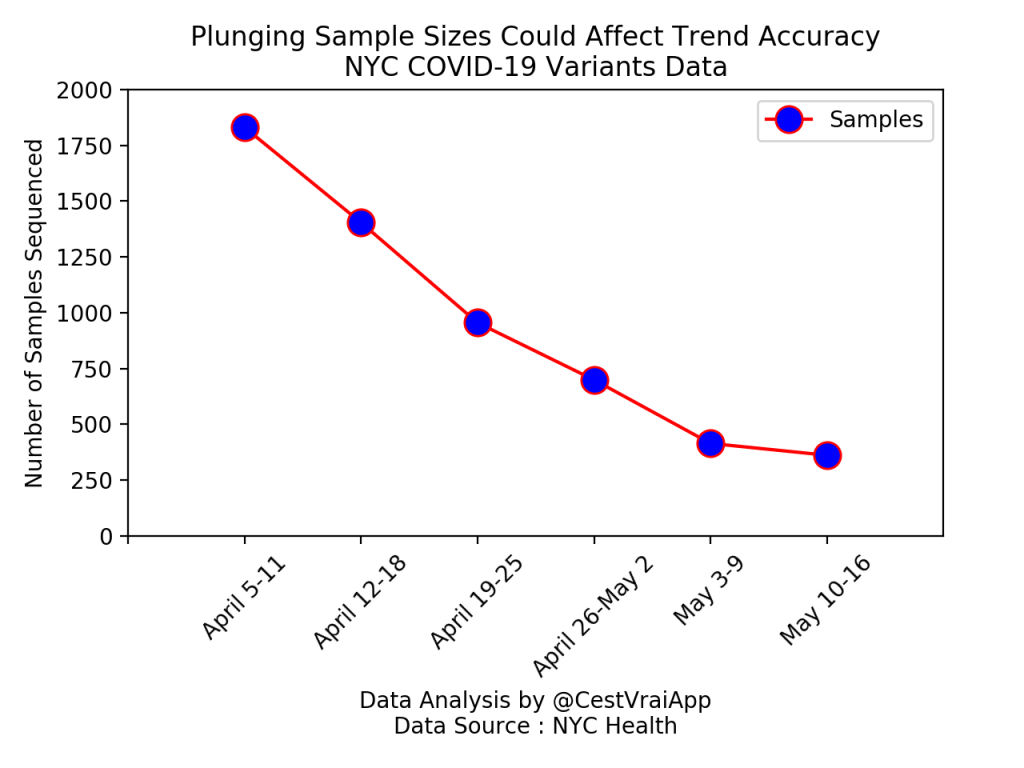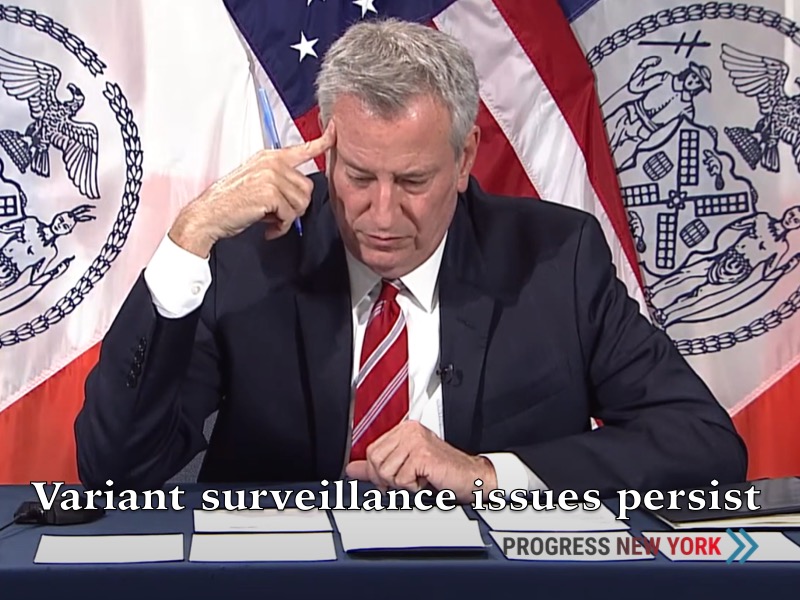The sample size used for weekly Coronavirus sequencing data reports has plunged from a recent high in April. Mayor Bill de Blasio offers no explanation.
By Progress New York Staff
Updated 27 May 2021 07:30 The weekly Coronavirus sequencing data report released Wednesday showed the fifth, consecutive week of a drop in the number of Coronavirus specimen samples used for the sequencing of variants by the de Blasio administration. The sequencing data, for the week of May 10-16, reported that the trend in a highly contagious Coronavirus variant that has been deemed a “variant of concern” by the World Health Organisation has only increased by one tenth of one per cent. from the prior week. The B.1.617.2 variant has been reported to be roughly 50 per cent. more communicable than another variant prominent in the United Kingdom, and in some parts of England this variant is causing the majority of infections. Infections by variants, like B.1.617.2, have possible attributes that are “predicted to affect” vaccine escape, according to the U.S. Centers for Disease Control and Prevention. Yet, the sequencing data released Wednesday showed almost no change in this particular Coronavirus substrain from the prior week week.
The collapse in the number of sample sizes raises questions about the Coronavirus variant trend data published by NYC Health, the Municipal Agency reporting the data.
For this report, Mayor Bill de Blasio (WFP-New York City) refused to admit that he was tampering with the sample sizes in order to distort the sequencing study findings. As Progress New York has reported, Mayor de Blasio has been solely focused on reopening the economy after the confinement orders issued beginning in March 2020 closed all nonessential business activity in New York City. An interview request made to the Mayor’s Office was never answered for this report.
The use of small sample sizes can raise questions about whether researchers are trying to influence study findings.

U.S. health ministers give mixed signals on variant monitoring, as U.K. struggles to contain new strain
By Progress New York Staff
Added 28 May 2021 10:00 One month after President Joseph Biden (D) announced a plan to spend $1,7 billion on Coronavirus variant surveillance, the Government quietly announced that it would stop tracking mild cases of vaccine escape of COVID-19.
In deliberations over the B.1.617.2 Coronavirus variant that has been ravaging India and spreading around the world, a scientific advisory board in the United Kingdom has expressed concern about the strain’s “increased transmissibilty and also the potential for *some* vaccine escape,” according to information shared by Prof. Christina Pagel, a member of the advisory board, Independent SAGE, a group autonomous from the U.K. Government.
As reported by Progress New York, the Municipal health ministry in New York City has been steadily decreased the sample sizes used to sequence for Coronavirus variants. The drop in the sample size used for weekly sequencing reporting has exceeded 80 per cent. from a recent high in April. The administration of Mayor Bill de Blasio (WFP-New York City) has refused to explain the collapse.
The plunge in New York City sequencing appears to contrast the approach by U.K. health ministers, who are “sampling around 50% to 60% of all positive Covid-19 samples,” according to a report published by Bloomberg. This week, the B.1.617.2 variant became the dominant strain in all new cases in the U.K., according to a report published by the BBC.
In statistical analysis, sample size can have huge implications on the generalisations drawn from results of studies.
As reported by Progress New York, the sample size for the weekly Coronavirus sequencing reports has been falling since a peak of 1,831 samples were sequenced for the week of April 5-11. This week’s report showed that a mere 361 samples were sequenced, a fall to 19,7 per cent. of its April high.
Because the de Blasio administration has refused to explain the drop, it is not known how a sample size that is less than 20 per cent. of what it was five weeks ago remains random enough to be able to ethically make generalisations about trends in Coronavirus variants that are infecting the general population, particularly since confidence levels and the margins of error of studies influence sample sizes in statistical analyses.
The drop in the sample size is taking place as the number of individuals, who are getting tested for the Coronavirus, is also dropping. According to NYC Health Coronavirus testing data, the seven-day moving average of combined antigen and molecular testing for 23 May stood at 68,6 per cent. of the number of tests taken when compared with the similar metric for 11 April.
At Wednesday’s press conference, Dr. Dave A. Chokshi, the commissioner for NYC Health, and Dr. Jay Varma, the mayor’s senior advisor on public health, acknowledged the drop in the number of Coronavirus tests being administered and explained the drop in testing as working in an inverse relationship to the number of increased Coronavirus vaccinations being given.
Placing so much emphasis on testing of the unvaccinated ignores asymptomatic vaccine escape infections, as well as the known concern with waning vaccine immunity that may require boosters, the latter an issue yet to be addressed by U.S. Government health ministers. Since Coronavirus testing appears to now be focused on the unvaccinated, that also can skew the randomness of weekly sequencing report data.
Does the de Blasio administration exhibit a pattern or practise of delaying or corrupting the release of Government data ?
In March, Mayor de Blasio faced criticism over the delayed release of Coronavirus testing data after test positivity results began to approach 15 per cent. in some City zip codes. This month, Coronavirus sequencing data was also delayed after it became apparent that NYC Health was not sequencing Coronavirus specimens for the B.1.617.2 variant that has reportedly been ravaging India, other South Asian Nations, and the U.K. Once the delayed Coronavirus sequencing data was released, study findings revealed for the first time the presence of the B.1.617.2 substrain in New York City.
From near the outset of his administration, Mayor de Blasio has reportedly sought to oversee the release of Government data for their political implications.
The reported obstruction of the release of Government data about the Coronavirus pandemic response by the administration of Gov. Andrew Cuomo (D-NY) has triggered a Federal inquiry. U.S. Attorney Audrey Strauss would likely claim jurisdiction over any violations of transparency by New York City Government. For this report, one of the spokespeople in her office informed Progress New York that they would not be able to comment about Mayor de Blasio’s handling of Government data.
Source Information
- New York City COVID-19 Variants Report (5.25.2021) [NYC Health]
Recommended Reading
- LETTER FROM NEW YORK : In New York, an élitism informs the economic reopening, even as a foreign COVID-19 variant, B.1.617, continues its spread [Progress New York]
- Not even Singapore’s notoriously strict rules could keep the Coronavirus at bay [The Washington Post]
- Following an unexplained delay, the de Blasio administration released Coronavirus sequencing data, showing the B.1.617 variant was first detected in New York City in April [Progress New York]
- de Blasio mum in the face of the unexplained delay in weekly data update of Coronavirus variants/strains in New York City [Progress New York]
- UPDATED : U.S. Attorney Audrey Strauss didn’t receive early, “special” access to scarce COVID-19 tests, unlike her daughter-in-law, Melissa DeRosa, who did : source [Progress New York]
It’s nationwide. The WH just put 1.7B towards sequencing and somehow the number of samples sequenced have dropped like a rock. pic.twitter.com/bS4n6kRJmF
— Joe Friday (@justthefacts85) May 26, 2021
From Jan 17 – May 22, 1,471 SARS-CoV-2 vaccine breakthrough cases have been identified in Washington State
Of cases with data available:
* 75% reported symptoms
* 9% were hospitalized
* 23 people died of COVID-related illnesshttps://t.co/sV06MuMTHR pic.twitter.com/NDLa0icbXm— wsbgnl (@wsbgnl) May 26, 2021
EDITORIAL : Mayor Bill de Blasio is obfuscating COVID-19 sequencing studies, masking the growth of the Delta variant, and the consequences could be deadly.

After Progress New York raised questions about the weekly variant sequencing studies, the de Blasio administration revamped the data — and made it more opaque. The only solution now is the formation of an independent, external panel of scientists to provide oversight. >> Read More

